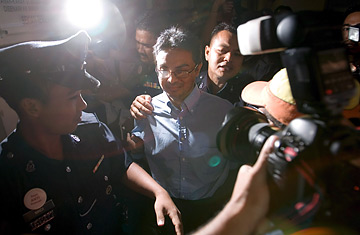
Malaysian political analyst Abdul Razak Baginda is escorted to the courthouse in Shah Alam outside Kuala Lumpur, Malaysia, June 4, 2007.
A Mongolian part-time model whose naked body was allegedly blown up by military-grade explosives. A former political advisor to Malaysia's Deputy Prime Minister charged with abetting the murder of his ex-lover. Two government security agents whom the prosecution alleges carried out the killing of the 28-year-old Mongolian woman. A loyal wife who, despite allegations of her husband's involvement in the plot, has worn a T-shirt to the murder trial that says "Mrs. Abdul Razak Baginda" on the front, "and proud of it" on the back. Welcome to what may be the most sensational case in an Asian courtroom today.
Malaysia, a tidy Southeast Asian nation that is often held up as a model of a Muslim-majority democracy, doesn't usually play host to a murder trial that seems better suited to an episode of The Sopranos. But the political implications of the death of model-turned-interpreter Altantuya Shaariibuu last October have riveted this country of 25 million, leading some to doubt the succession hopes of the current Deputy Prime Minister. For others, the trial, which opened on June 18, will serve as a bellwether of the integrity of Malaysia's legal system and its burgeoning press. Last fall, several local journalists were detained after covering the case but were later released. Since then, the local newspapers have reported the minutiae of the case in increasingly scandalous detail.
The story begins in 2004 when a polished Malaysian think-tank director named Abdul Razak Baginda met the comely Shaariibuu at a gala in Hong Kong. A married father, Abdul Razak, now 47, had been educated in Britain and had written several books on Malaysia's political economy. He and Shaariibuu began a romantic relationship, meeting up for secret liaisons across Asia. Eight months later, Abdul Razak broke off the affair, according to the prosecution and a court affidavit filed by him. Abdul Razak alleges that Shaariibuu then began blackmailing him, presumably threatening to make their relationship public if he did not pay up.
By the spring of 2006, however, Abdul Razak says he stopped sending money. Shaaribuu traveled to the Malaysian capital Kuala Lumpur in October 2006. In the affidavit, Razak says that after the Mongolian showed up in town, he confided in a high-level security officer who worked for Deputy Prime Minister Najib Razak. Then, on October 19, according to Razak's affidavit, the think-tank head called a police officer associated with a high-level unit that provided security for top Malaysian leaders to tell him that Shaariibuu was standing outside the gate of his house, a car with three police agents pulled up and took the Mongolian woman away. Several witnesses saw Shaariibuu entering the vehicle. That was the last Abdul Razak says he ever saw of his former paramour.
Abdul Razak, who was later charged with abetting murder, has pleaded not guilty. For their part the two policemen charged with carrying out the murder have also pleaded not guilty. Shaariibuu's burned remains were found in a jungle outside Kuala Lumpur on November 6. All three could face the death penalty if convicted.
Widespread scrutiny of Malaysia's court system arose nearly a decade ago when former Deputy Prime Minister Anwar Ibrahim was convicted of sodomy and abuse of power, a ruling condemned by human-rights groups. Already, hints of legal impropriety have stained this case. The original lead prosecutor was removed from his position after it became known that he often played badminton with the presiding judge.
There has been press speculation in Malaysia and abroad that the case may affect Deputy Prime Minister Najib Razak, a friend and associate of Abdul Razak. That is not yet clear. Heir-apparent Najib has denied any involvement in the case, and no evidence whatsoever has emerged linking him with the woman's death. Malaysian Prime Minister Abdullah Ahmad Badawi has promised that politics will not influence the outcome of the trial. But any link to such a lurid murder can't be good news for Malaysia's ruling party. The case will likely continue over the next couple months, just as the southeast Asian nation celebrates 50 years of independence. With local newspapers covering the case with unprecedented enthusiasm, Malaysians can look forward to a most salacious summer.
